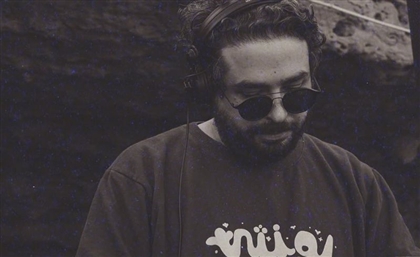MOSHTRQ’s Hnemou Investigates Identity in New EP ‘Bab Hwita’
A drum and bass afficionado at heart, the Paris-based Tunisian producer serves up an engaging three-track EP through Cairo-based audivisual collective, MOSHTRQ.

Having emerged in late 2021 as an event series looking to break the stranglehold of a house-heavy Egyptian scene, the elusive and ineffable collective that is MOSHTRQ has unleashed a new EP by Paris-based Tunisian music-maker, Hmenou - a connoisseur of drum and bass.
Bab Hwita comes as the group’s second release of 2025, following the June release of MOSHGHBA from Hisham and Darb, and their third overall, having released MOSHTRQ VA01 in 2023.
Described as both a literal and metaphorical journey into the intersection of drum and bass and cultural memory, it showcases Hmenou’s unique and dynamic sound palette and is a fitting entry into the collective's all-caps catalogue.
The opener, ‘Studio 22', quickly establishes the EP's cross-Mediterranean essence, as its pulsating drum and bass energy meets the urgent poetry of Ramallah rapper, Elos Byuri. The result is a fierce, boundary-crossing anthem, a statement of a shared sense of rhythm and resistance.
Hmenou leans into Tunisia’s cultural subconscious in ‘Zaretna El Barka; which comes as a homage to his homeland’s history. The voice of legendary 1920s singer, Habiba Msika, and of snippets of political speeches and radio broadcasts enrich a haunting ensemble of sounds that find balance between nostalgia and contemporary production.
Closing the EP, 'TU722' (named after the Tunis-Paris flight known to be regularly delayed) provides arguably the most powerful imprint of Hmenou’s vision, as he expresses a struggle between the two locations, the two worlds which inform both his world-view and music. It tricks you with a sense of minimalism, but as crushing basslines break through, it turns anthemic, relentless in its seeming catharsis.
The closer also best encapsulates Hmenou’s exploration of identity and belonging, a battle that often questions and inspires in equal amounts. What he proves with Bab Hwita, however, is that cultural memory, whether shared or individual, isn’t set in stone. It’s undefinable in scope, malleable in expression and, ultimately, available for reinterpretation - particularly when viewed through the lens of a contemporary sound that rejects commercialism in favour of a more critical, DIY philosophy.
- Previous Article At a Masterclass by the World's Best Restaurant
- Next Article Eco-Friendly 3D Printing Center Will Launch in Egypt in 2026



























